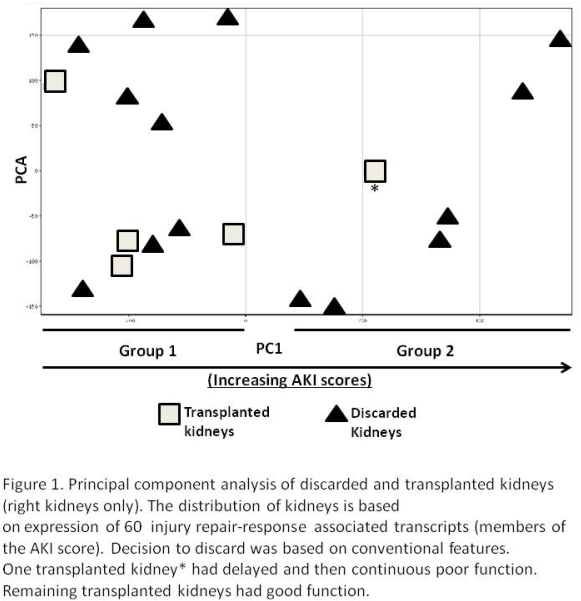Gene Expression Profiles Indicate That Many Discarded Kidneys Are Potentially Transplantable
1University of Alberta, Edmonton, Canada
2University of Marlyland, Baltimore.
Meeting: 2015 American Transplant Congress
Abstract number: D65
Keywords: Biopsy, Cadaveric organs, Renal injury
Session Information
Session Name: Poster Session D: Immunology, Biomarkers and Immunosuppression
Session Type: Poster Session
Date: Tuesday, May 5, 2015
Session Time: 5:30pm-6:30pm
 Presentation Time: 5:30pm-6:30pm
Presentation Time: 5:30pm-6:30pm
Location: Exhibit Hall E
We previously showed that the molecular kidney injury-repair response (AKI score) in implantation core biopsies (Bx) predict future graft function better than histology. This could be applied to the problem that many kidneys from donors >50 years old are discarded due to uncertainty based on conventional features (clinical or histology). We hypothesized that AKI scores in transplanted kidneys will be similar to some discarded kidneys when decision to transplant is based on conventional features.
Pre-implantation core and wedge Bx from transplanted and discarded kidneys were obtained from brain dead >50 years donors. Decision to discard was based on MAPI scores of wedge Bx in 8/14 discards. All wedge Bx were examined for molecular AKI scores and global gene expression by microarrays. The AKI scores of core and wedge Bx within the same kidney showed very high correlation (r=0.90), confirming that both Bx types are suitable for molecular testing. The molecular AKI scores in all kidneys were compared by principal component analysis (PCA).  PCA defined two sets of kidneys: Group 1 and Group 2. Group 1 had low AKI scores, including 8 discarded kidneys and 4 transplanted kidneys. Thus many discarded kidneys had low AKI scores similarly to transplanted kidneys and were potentially transplantable. Group 2 contained 6 discarded kidneys and one transplanted kidney, all with high AKI scores.
PCA defined two sets of kidneys: Group 1 and Group 2. Group 1 had low AKI scores, including 8 discarded kidneys and 4 transplanted kidneys. Thus many discarded kidneys had low AKI scores similarly to transplanted kidneys and were potentially transplantable. Group 2 contained 6 discarded kidneys and one transplanted kidney, all with high AKI scores.
We identified 775 transcripts associated with PC1 of the AKI scores. Pathway analysis (p<1E-05) demonstrated that kidneys with high AKI scores had decreased expression of genes related to oxidative phosphorylation paralleled by activation of their negative regulator, RICTOR and suggestive of activation of MTORC2 pathway. These kidneys also had increased expression of genes related to antigen presentation driven by IFNG and increased acute phase stress response. Thus discarded kidneys with high AKI scores were more stressed.
Combination of molecular features with the histological evaluation of biopsies may lead to improved kidney utilization from older donors and mechanistic insights into why such kidneys have impaired performance.
To cite this abstract in AMA style:
Famulski K, Niederhaus S, Reeve J, Bromberg J, Halloran P. Gene Expression Profiles Indicate That Many Discarded Kidneys Are Potentially Transplantable [abstract]. Am J Transplant. 2015; 15 (suppl 3). https://atcmeetingabstracts.com/abstract/gene-expression-profiles-indicate-that-many-discarded-kidneys-are-potentially-transplantable/. Accessed July 9, 2025.« Back to 2015 American Transplant Congress
